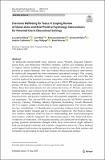Evermore Wellbeing for Teens: A Scoping Review of Stand-alone and Brief Positive Psychology Interventions for Potential Use in Educational Settings.

Auteur, co-auteurs
Type de référence
Date
2025Langue de la référence
AnglaisEntité(s) de recherche
Résumé
As adolescent mental health crises intensify across Western, Educated, Industrialised, Rich, and Democratic (WEIRD) countries, schools face mounting pressure to support student wellbeing without sacrificing academic priorities. This tension presents an urgent challenge: how can evidence-based psychological interventions be realistically integrated into time-constrained educational settings? This scoping review systematically identified evidence-based, stand-alone, and brief PPIs that could be explored for potential classroom integration, while highlighting the need for future research. Through an analysis of Carr et al.’s (2023) PPI mega-analysis, comprising 198 meta-analyses, we screened 1367 interventions for educational compatibility. Sixty-four interventions met our criteria for brevity (5–10 min), stand-alone implementation, and evidence-based effectiveness. These interventions span diverse domains including gratitude practices, Best Possible Self exercises, movementbased activities, and positive reminiscence, all potentially adaptable to standard lesson timeframes. The selected PPIs were evaluated using the ACTIONS framework (Activity, Calming, Thinking, Identity, Optimism, Nourishing, Social) (Boniwell, 2017) to support careful consideration in future implementation. This review offers two key contributions: (1) identification of promising evidence-based interventions that warrant further research and (2) a theoretical framework. The Positive Education Toolbox Approach (PoETA) aims to understanding how brief psychological interventions could be integrated into educational practice. The framework draws on theories of motivation, self-regulated learning, and adolescent development, suggesting potential mechanisms through which these interventions might influence both psychological wellbeing and academic engagement processes. These findings could support both teachers in integrating wellbeing practices into daily routines and researchers in developing focused interventions for educational settings.Titre du périodique
Educational Psychology ReviewMaison d’édition
SpringerPays d'édition
Etats-Unisp-ISSN
1040-726Xe-ISSN
1573-336XEvaluation par les pairs (peer reviewing)
ouiVolume / tome
37/63Pagination
1-67URL permanente ORFEE
http://hdl.handle.net/20.500.12162/8448Autre(s) URL(s) permanente(s)
http://doi.org/10.1007/s10648-025-10033-3La publication existe uniquement sous forme électronique
ouiDocument(s) associé(s) à la référence
Texte intégral :
Fichier
Accès
Commentaire
Version
Taille
- Tout ORFEE
- Détail référence



